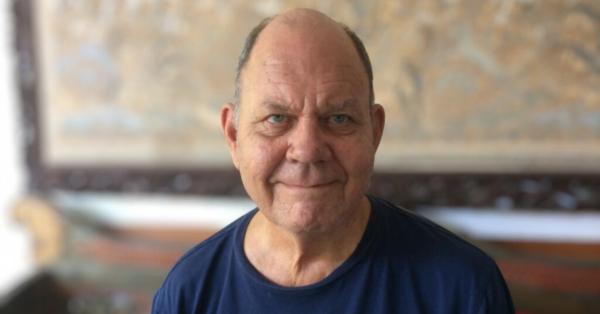
Gaelyn Godwin, Shungo Suzuki, and Meiya Wender at Rinso-in; the altar is filled with congratulatory words accompanying flower arrangements.
By Tova Green
On the weekend of October 22, 2022, Rinso-in, Shunryu Suzuki’s home temple in Yaizu, Japan, celebrated the 550th anniversary of its founding. Meiya Wender, the Godo (Senior Teacher) and Tea Teacher at Green Gulch Farm, and Konjin Gaelyn Godwin, Abbot of Houston Zen Center, attended the weekend-long series of ceremonies and events. The events also included the fifty-year memorial service for Shunryu Suzuki Roshi (delayed a year due to the pandemic), and a memorial service for Mitsu Suzuki, his wife, who died seven years ago.

Gravesite of Mitsu Suzuki Sensei at Rinso-in.
Japan was closed to visitors due to Covid restrictions until October 11, a few days before Meiya and Gaelyn met in Yaizu. They arrived a day early to assist the Suzuki family and temple members with preparations for the ceremonies, including deep cleaning of the temple, its cemetery and grounds.
Rinso-in was originally built on the coast (Yaizu is a coastal town) in 1471 and was relocated to a higher site in 1497, as there were predictions of an earthquake and tsunami. An earthquake did occur in the area in 1498, and the temple survived it. The temple has been renovated many times and added facilities which make it possible to host groups of Zen practitioners. Meiya described its unusual location, nestled into a hillside at the edge of a large bird sanctuary, protected from development. She considers it one of the most beautiful temples she’s seen in Japan.
Rinso-in is the head temple for over two hundred sub-temples. At least thirty priests from those temples came to help conduct the weekend’s ceremonies. Meiya and Gaelyn were the only Westerners who attended.
On Saturday morning attendees sat zazen outdoors on the hill above Rinso-in. Issho Fujita gave a talk that afternoon. Hoitsu Suzuki Roshi, Shunryu Suzuki’s son, also spoke. He related how it was for the family and for the temple when Suzuki Roshi left for San Francisco in 1959. Hoitsu was a twenty-two year old college student at the time and was not ready to become the Abbot, so Rinso-in had an interim abbot.

Congratulatory flowers sent by San Francisco Zen Center.
Meiya noted that 1959 was only fourteen years after the ending of World War II. There was still a lot of hardship in Japan; it was not the prosperous country it is today. She pointed out that when we think of the history of SFZC, we emphasize how wonderful and fortuitous it was for Suzuki Roshi to arrive in San Francisco. However, we don’t necessarily think about what it was like for his family and the temple members who were left behind. The eventual founding of San Francisco Zen Center was, of course, dependent on the efforts of Suzuki Roshi’s students, supporters, and donors in the United States. It also could not have happened without the efforts of the members of Rinso-in, who supported the temple to continue functioning during that time and until Hoitsu Suzuki was able to become the next abbot.
Participating in this weekend celebration expanded Meiya’s understanding and appreciation of SFZC’s long connection with Rinso-in, its community of practitioners, and the Suzuki family. “It’s like an underground aquifer. One doesn’t necessarily even know of its existence, but it endlessly supplies life-giving water, without which our temples would not be able to flourish.”
Rinso-in members appreciated Gaelyn’s and Meiya’s participation in the celebrations as representatives of the flourishing of Suzuki Roshi’s teachings and legacy in the United States. San Francisco Zen Center and its Branching Streams sanghas sent flower arrangements, which were placed on the main altar, and congratulatory telegrams which were read aloud to the assembly. Meiya brought a donation from San Francisco Zen Center accompanied by a letter of congratulations from Central Abbot Ed Sattizahn, translated into Japanese.
The celebration of Rinso-in’s 550-year history was also an opportunity to celebrate Shunryu Suzuki Roshi’s influence in the growth of Zen in the West at a time when his teaching is also spreading in Japan. Zen Mind Beginner’s Mind has been translated into Japanese and was published in September 2022 as a paperback, with an introduction by Issho Fujita, extending Suzuki Roshi’s teachings back into the Zen tradition from which they arose.











